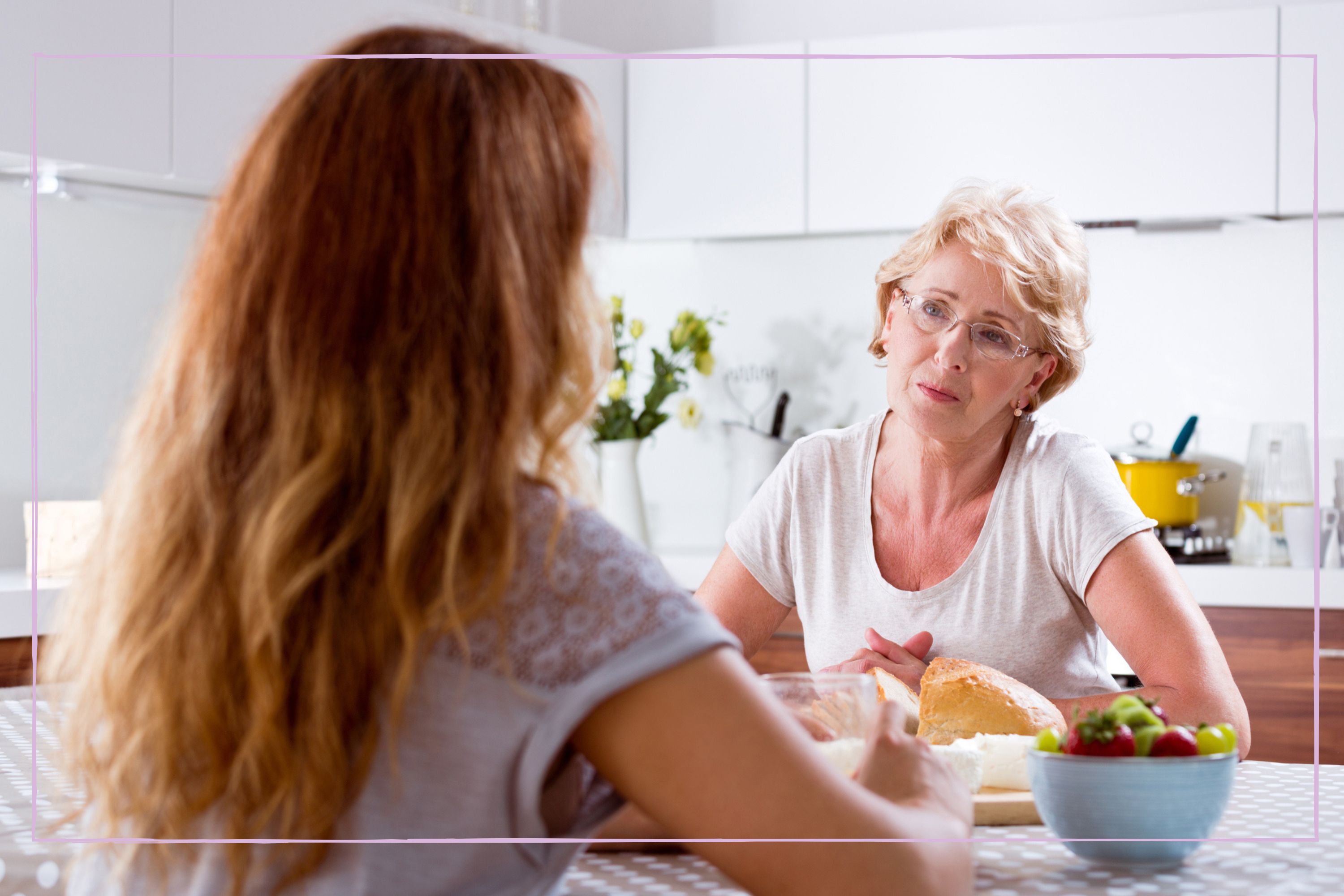‘My relationship with my mum changed when I had a baby’ - expert shares how to deal with this challenge
The relationship sometimes needs serious adjustments when a baby enters the dynamic


It's natural for mother/daughter relationships to change once an adult daughter has a baby, but adjusting to that change can be a challenge - an expert shares why these differences happen and what you can do about them.
Your mum can be a fantastic source of support once you have a baby, and mothers supported by maternal grandmothers are less likely to struggle with their mental health if they get regular help from them. Having a mum willing to take on childcare can be such a help to parents, with some even likely to retire early to help out with a grandchild.
While all this is really positive, if you're one of the people who finds their relationship with their mum changes when they have a baby, it can be quite a challenge. Mother-of-two, Jess, tells us "Me and my mum always had such a solid relationship. I called her all the time, and she'd sometimes just bustle into my house unannounced and change things around - I didn't mind, it was just how we were. When I had children, I suddenly found the lack of boundaries irritating but didn't know how to implement them - and resentment towards my mum built.
She'd also never expressed particularly strong views about anything really, when I was a kid. But she suddenly started obsessing over my children's vitamin intake and bringing over multivitamins and liquids to add nutrition to their food. There were other things that happened that I found odd, and I found I started avoiding seeing her which I'd never felt the need to do, ever. It was really disorientating to suddenly feel like that about her."
To understand more about this shifting dynamic some experience after having their own children, we spoke to BACP registered counsellor, Helen Hazell-English. Helen tells us it's not always easy to pinpoint the cause of a changing mother/daughter relationship, saying "There can be multiple, inter-related reasons why mother/daughter relationships can become strained once grandchildren arrive. These will be influenced by the individuals personalities, values and life histories as well as by their past and present relationship. Also, their context - which includes family dynamics, culture, time and place, and socioeconomic stressors/privilege – may also affect their relationship."
However, Helen breaks down the most common reasons for this shift in mother/daughter relationships:
3 common reasons mother/daughter relationships change
- Difficult childhood experiences re-emerging in the awareness of the new mother as she raises her own children. It can be triggering to be around our own parents while processing this.
- Differences in ideas/updated knowledge about parenting. For example, it’s very common for contemporary parents to aim to give children lots of respect, emotional literacy, and support - yet they may have been raised in a more authoritarian and emotionally repressed way.
- Difficulty adapting to new roles. For example, the (grand)mother may struggle to accept her daughter as the authority in her parenting and adult life. There may also be differences in expectations regarding the amount of help required from grandparents or contact with the grandchildren. An already strained relationship can also become more obvious once there is an expectation of more contact.
Helen adds "All of these reasons essentially boil down to communication – in particular difficulties speaking respectfully about what we want and need, and our boundaries.
Parenting advice, hot topics, best buys and family finance tips delivered straight to your inbox.
And what exacerbates the issue is that women are often raised to be "good girls" who communicate in a more passive way and worry about upsetting and caring for others. This dynamic can really trip mothers and daughters up at a time when the family system has changed - the daughter is changed and is re-evaluating everything in her life!"
Jess says this really resonates with her, telling us "I was your quintessential 'good girl.' Never spoke up if something concerned me, and went out of my way to make sure everyone around me was OK and was the people pleaser and peace maker. I think that lack of boundaries is manageable until a child comes along and changes everything.
I developed a fierceness and confidence when I had my children I'd never had before, and I think mum was inadvertently reacting to not being 'in charge' of me anymore, and I didn't have the communication skills to overcome what had come between us."
"Women are often raised to be "good girls" who communicate in a more passive way and worry about upsetting and caring for others. This dynamic can really trip mothers and daughters up at a time when the family system has changed - the daughter is changed and is re-evaluating everything in her life!"
Helen Hazell-English
What can you do to rebuild your mother/daughter relationship?
Helen recommends the following tips:
- Don't just hope things work themselves out. Helen says "Just getting on with the way things were rarely works, yet talking constructively about how to be creative and adapt as two people who love each other is something many of us struggle to do. I wish there was more awareness that all relationships change after having children."
- Try not to feel threatened. Helen adds "Rather than feeling threatened, we should expect the relationship to look a little different and work through it together with our nearest and dearest - with huge amounts of grace for everyone but especially the new mum as she finds her way in her new role.
- Give both parties a safe place to express their feelings. Helens tells us "Working towards a better relationship ideally involves both parties feeling able to safely express how things are for them - without judgement. It’s also important to address together the things that aren't working and what their hopes and wishes are - acknowledging that it 'takes two to tango'. This assumes no abusive dynamics of course."
- Clarify what you want. By this, Helen suggests the daughter taking time to carefully reflect on what's gone wrong. She says "The daughter could explore and clarify what she wants, consider what she can control, what she can't, what her boundaries are and what she can accept and not accept in her relationship with her mother. Also, what is realistically possible."
- Seek professional help if you need it. Helen continues "This is complicated interpersonal communication at a stressful time for the new parent. If the parties have very differing levels of emotional maturity or comfort discussing relationships, it may be necessary to seek professional help."
- Accept you might not get the outcome you want. As upsetting as it could be, the mother/daughter relationship could be altered for good. Helen concludes "There may be some grieving and letting go to do. It may be that a more functional, happy and less painful relationship is possible, but one where some emotional intimacy goals can't be met."
Family dynamics are tricky to navigate, especially if you believe you have a toxic mother, or need to find peace with absent parents. Growing up with an emotionally immature parent can have implications on you as an adult, and be equally difficult to navigate.

Helen Hazell-English is a registered BACP counsellor and the founder of Mum Therapy. Helen provides online counselling for mums and mums to be, and her particular interest is normalising mixed feelings about motherhood. She supports her clients with the intensity of the early years by focusing on their own needs and personal development.

Lucy is a mum-of-two, multi-award nominated writer and blogger with six years’ of experience writing about parenting, family life, and TV. Lucy has contributed content to PopSugar and moms.com. In the last three years, she has transformed her passion for streaming countless hours of television into specialising in entertainment writing. There is now nothing she loves more than watching the best shows on television and sharing why you - and your kids - should watch them.